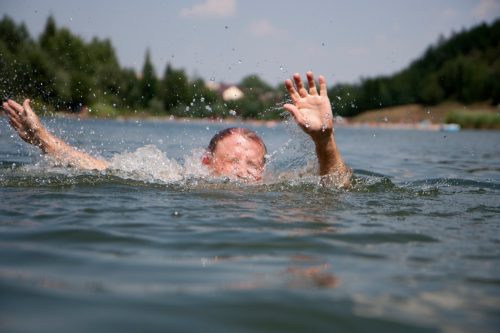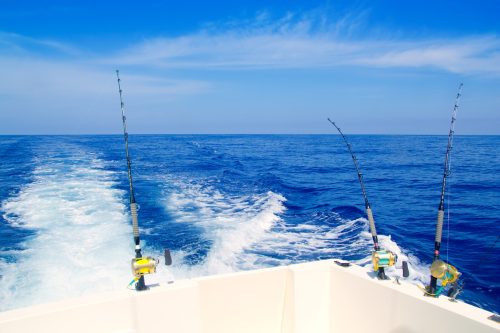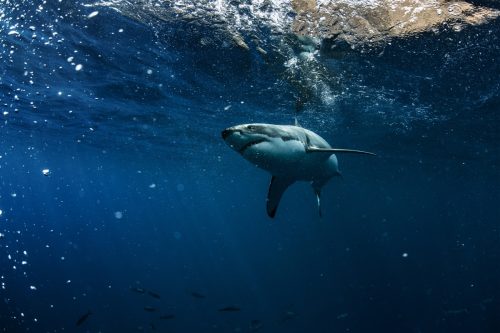8 Life-Saving Tips to Avoid a Shark Attack
Shark experts offer guidance on staying safe while swimming in open water.
While most of us go to the beach to relax, it's hard to ignore the reality that shark attacks are on the rise in places like Long Island, Florida's Gulf Coast, and California's Monterey Bay. The Florida Museum of Natural History's International Shark Attack File (ISAF), which tracks and investigates shark-human interactions, reports that there were 47 confirmed shark attacks in the U.S. in 2021, up 42 percent from 33 incidents the year prior. Though your chances of being harmed are still extremely low, shark attacks remain a very real fear among swimmers and surfers, especially since increasingly warmer waters are more welcoming to these big fish. Luckily, the steps one can take to avoid a shark attack are fairly straightforward. Read on for life-saving tips from shark experts that you can employ in the ocean.
READ THIS NEXT: If You've Done This, Don't Go in the Ocean, Doctors Warn—And It's Not Eating.
1
Don't swim solo.

According to the ISAF's tips on avoiding a shark attack, "always stay with a buddy, since sharks are more likely to approach a solitary individual." This will also help you stay calm in the event of a sighting, a very important thing to remember as sharks are more afraid of us than we are of them, according to Julie Andersen, global director of brand for PADI Worldwide (as well as a founder of Shark Savers, Shark Angels, and Fin Free).
If you do spot a shark, "maintain eye contact and make sure the shark sees you. Often, they are opportunistic predators and won't take a chance if they know they've been spotted," Andersen says. "Swim or move slowly and with your eyes on the shark until you are out of the water."
And always avoid splashing. "Sharks can hear the low-frequency sounds from splashing and may investigate to see if there is a fish/prey in distress," cautions the ISAF.
2
Avoid wearing metallic jewelry or high-contrast swimsuits.

The ISAF says to avoid wearing metallic jewelry "because the reflected light may resemble the sheen of fish scales." Many people will also tell you to avoid wearing bright colors, referring to the "yum yum yellow" theory that sharks are most drawn to this neon hue. However, Andersen says the theory has been disproven scientifically. "Sharks see in shades of grey, meaning they detect contrast rather than color," she explains. Therefore, it's better not to wear a swimsuit that's, say, black and white striped.
For divers, a lot of safety equipment comes in a bright yellow color (as it's easy for rescuers and other humans to spot). While ISAF agrees that this isn't such a big danger, they do say they prefer "dark blue or black fins, mask, tank, and wetsuit while diving."
READ THIS NEXT: If You See This Growing in the Water, Beware of Sharks, Experts Say.
3
Be mindful of where you're swimming.

Your chances of encountering a shark are greater the farther you are from shore. (You're also farther from any potential emergency assistance, of course.) But the ISAF warns that sharks' favorite hangouts are "the area between sandbars or near steep dropoffs."
4
Bypass areas where people are fishing.

Sharks like to eat fish, and recreational or commercial fishing has the goal of attracting lots of fish to one area. Sounds quite appetizing to a shark, right? Most experts agree it's best to avoid swimming in areas where any type of fishing is taking place, but there are also some more nuanced indicators that fish are present. "If you see birds diving or fish jumping, that could be [an] indicator that a larger predator, perhaps a shark, could be attempting to prey upon a school of fish," marine biologist Chuck Bangley, PhD, told NBC News.
A common misconception is that the presence of porpoises or dolphins means sharks are not nearby, but the ISAF says this isn't the case as "both often eat the same food items." But seeing a beautiful pack of dolphins doesn't necessarily spell danger. In fact, TikTok user Kayleigh Grant, who's a professional dive instructor in Hawaii, posted a viral video last year of a dolphin seemingly saving her from a shark. And according to SeaWorld, there are many reasons why sharks are scared of dolphins.
For more safety advice delivered straight to your inbox, sign up for our daily newsletter.
5
Steer clear of seals and sea lions.

Large sharks, such as the very commonly spotted great white shark, regularly eat seals and sea lions. Because these marine mammals are "high in fat due to their blubber, they are an extremely nutritious meal for a large shark," according to American Oceans. "One large seal or sea lion can sustain a shark for an entire week." Therefore, it's wise to steer clear of waters with a large seal or sea lion presence, especially since sharks can sometimes mistake a human for their prey.
6
Skip swimming at dawn or dusk.

Sharks usually feed at dawn or dusk, moving toward the shore to find something to eat. It's advisable to avoid swimming at these times. Andersen notes that sharks are "ambush predators," meaning they use low-visibility times to their advantage to suddenly attack their prey.
7
Don't swim in murky water.

Just like it's hard for you to see in murky water, it's hard for sharks, increasing the chances that they won't be able to tell you apart from a fish or seal. Waters can become cloudy after a storm "while it is churned up and full of runoff," notes Andersen, who says river mouths are another particularly murky locale.
READ THIS NEXT: If You See This at the Beach, Don't Go in the Water, Experts Warn.
8
Stay out of the water if you're bleeding.

One of the shark attack "facts" that's caught on in the mainstream media is that sharks can smell blood when a person is menstruating. Though sharks have a very powerful sense of smell and can detect menstrual blood in the water, they aren't attracted to human blood, Andersen explains. "A shark is far more likely to be attracted to blood from a marine animal. Fish, seals, whales, and other prey have fish oil in their blood, which scientists have proven is what sharks are attracted to," she says. She also notes that almost 80 percent of shark attacks involve men.
The ISAF agrees, saying "there is no positive evidence that menstruation is a factor in shark bites." However, they do include on their safety list that "it may still be advisable to stay out of the water if bleeding from an open wound." Again, sharks aren't inherently attracted to the blood, but the scent could serve as an indicator that something else is moving around in the ocean.
When it comes to shark attacks, Andersen advises us to remember that "the statistical reality is that sharks do not regularly bite and certainly don't eat people … If you look at the numbers, literally everything is more dangerous to humans, including dogs, mosquitos, hippos, air fresheners, toilets, buckets, and even falling coconuts."






















